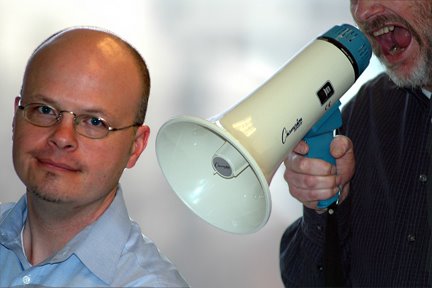Graham Shows Hypocrisy on Metro Transit Rights Issue
In his reluctance to seek a fix to the broken D.C. noise law, D.C. Councilmember Jim Graham—who chairs the Committee on Consumer and Regulatory Affairs—says he wants to help H and 8th Street NE residents and businesses find relief from hours of noise blaring from one group’s amplifier. As a Metro Transit Board member, he also should remember the intersection is a very busy Metro Transit bus stop.
Graham claims he needs more ideas to address the broken noise statute, lest it diminish someone else’s rights. A story in today’s Washington Post shows his conflicted view of those rights he fears to trample.
According to the Post story, Graham—who represents D.C. on the Washington Area Metro Transit Board of Directors—took issue with fellow board member Robert Smith’s remarks about homosexuals, which were made on a political affairs cable television show. Graham brought up the issue during a Metro board meeting:
The H and 8th Street NE residents in pursuit of peace and quiet in a residential area have focused on the issue of unreasonably loud amplified speech. This is a health and safety issue. We contend that the content of that speech is a protected first amendment right.
However, we also should not be forced to listen—in our own homes or in H Street businesses—to the ugly, hateful words against homosexuals, whites, Koreans, Muslims, or Christians.
Worse, the Metro Transit customers who wait at the bus stop located in the amplifier’s crosshairs are the ones that receive the brunt of the high decibels and hateful content. Whether it’s damaged hearing or harassment, these also are Graham’s constituents whose rights he claims to care so deeply about.
If Council/Metro Transit Board Member Graham believes what he says, his principles should be applied evenly—on behalf of the Metro bus riders, the residents and businesses of H and 8th Street NE.
Graham claims he needs more ideas to address the broken noise statute, lest it diminish someone else’s rights. A story in today’s Washington Post shows his conflicted view of those rights he fears to trample.
According to the Post story, Graham—who represents D.C. on the Washington Area Metro Transit Board of Directors—took issue with fellow board member Robert Smith’s remarks about homosexuals, which were made on a political affairs cable television show. Graham brought up the issue during a Metro board meeting:
At the Metro meeting, board member Jim Graham, who represents the District, had called for Smith to disavow his remarks or apologize or for Ehrlich to remove him. “As someone who cares deeply about human rights, and as an openly gay elected official . . . I cannot remain silent in the face of these comments,” Graham said, reading from a prepared statement.Smith was removed from the board by Maryland Gov. Robert Ehrlich.
The H and 8th Street NE residents in pursuit of peace and quiet in a residential area have focused on the issue of unreasonably loud amplified speech. This is a health and safety issue. We contend that the content of that speech is a protected first amendment right.
However, we also should not be forced to listen—in our own homes or in H Street businesses—to the ugly, hateful words against homosexuals, whites, Koreans, Muslims, or Christians.
Worse, the Metro Transit customers who wait at the bus stop located in the amplifier’s crosshairs are the ones that receive the brunt of the high decibels and hateful content. Whether it’s damaged hearing or harassment, these also are Graham’s constituents whose rights he claims to care so deeply about.
If Council/Metro Transit Board Member Graham believes what he says, his principles should be applied evenly—on behalf of the Metro bus riders, the residents and businesses of H and 8th Street NE.


1 Comments:
Keep up the good work!
May I suggest -- the economic argument is the strongest. It's clear the council doesn't care about resident's rights, but they might buy the argument that H St. can't take off as long as there is amplified noise assaulting potential customers.
To that end, your next protest should aim to drive away customers from politically influential business owners. Find the biggest movers and shakers, and plant yourself outside their businesses. Regularly.
They will be on the horn to the councilmembers so fast it will make your head spin.
Post a Comment
<< Home